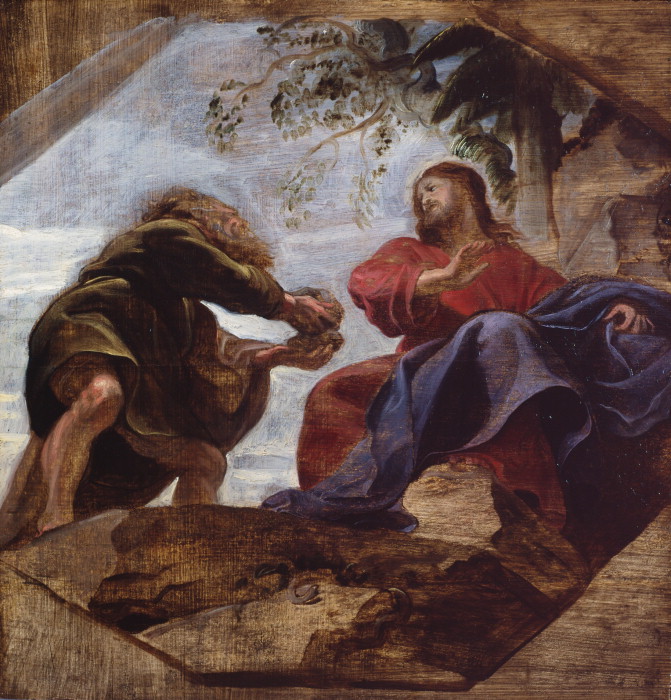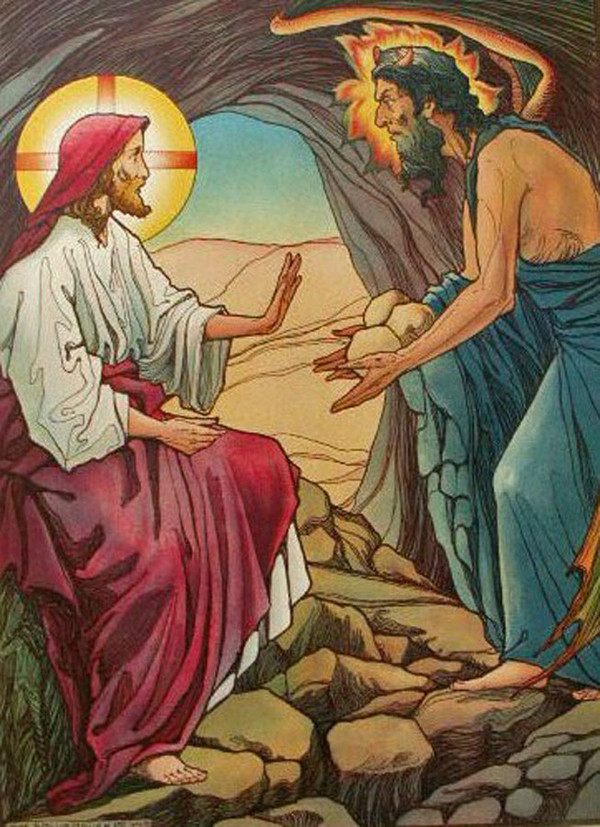
Have mercy on me, O Lord, Son of David; my daughter is severely oppressed by a demon.
Again we come across the Kyrie, the prayer, “Lord, have mercy on me.” The prayer comes up ten times in Psalms, and five times in the Gospels. Blind Bartimaeus and his companion (the two blind men), the man with the epileptic son, the two blind men that followed Jesus to the house, the ten lepers, and the Canaanite woman all cried out “have mercy on me.”
In a previous meditation, we covered how worship is formal because we have a formal Savior and ourselves are formal beings. This Gospel explains how. And again we get clarity by contrasting the basis of formal worship with its opposite, Gnosticism.
Gnostics hate formalism. In the Gnostic system, forms are impositions of an alien god on what should be one and undifferentiated. This is why they despise the flesh and materiality: flesh and materiality are that in which forms become manifest. There is no such thing as “cat” (either the word or the being) until this world’s inferior God forced there to be this furry, formed, material thing doing cat things that we all understand objectively to be “cat.”
Of course we reject all this. How then do we understand things in a faith that cherishes the creation and incarnation? Let’s continue our example of the cat.
Once “cat” arises, “cat” runs what it means to be “cat.” And we receive “cat” as it is. In a sense, we receive it as a gift. We – forms ourselves and defined by our own materiality – are passive receptors of whatever “cat” is, delighting in its uniqueness. A question might be asked, do we do “cat” or does “cat” do us?
What in God’s name does this mean? “Cat” is determined not by some “construct” we, or the powers that be, impose on some fluidly, randomly changing thing. That would be us doing “cat,” and don’t think this bizarre. There are many modern philosophers who would argue that in fact, we do “cat,” that all such things are constructs and products of our mind’s making.
By contrast “cat” arises and is governed by an actual cat doing cat things as God created it to do. By observation, we’re like Adam, receiving what “cat” is and thinking about it as a unique creature with an associated concept and name, something to discuss as part of human language.
OK, that’s a lot of setup for the day’s theme. Reminiscere’s Gospel demonstrates the same concept when applied to faith. Do we do faith or does faith do us? If the object of our faith is indeed a formed, external, material “thing” – as Christ is – then we’d say the faith does us.
The modern philosopher way would be to say that faith is a construct we subjectively define. This is the “I feel it in my heart” way of faith. But there’s danger here. How many people’s faith becomes shipwrecked because it’s as sure as their ability to construct what faith means “to them”; but how wobbly we truly are!
Unfortunately, so much of our Christian practice fosters this idea of “us doing the faith.” That brings us to informal worship, the idea that a “worship team” on Thursday night will construct a worship service based on who knows what. They’re constructing the faith; they’re doing the faith.
And this is why formal worship needs to be upheld. In formal worship, the object of faith, like “cat” remains distinct and unique from us, so that we receive it in its totality and uniqueness, without adding anything to it or “constructing” it as if it needed to be constructed. It is gift, because it is always something external to us, something formed, something where there are clear lines where it ends and I begin. It’s not my words, but God’s Word. Like “cat” running what it means to be “cat,” faith runs what it means to be faith.
How does this work? And here, this week’s Gospel explains.
The Kyrie, the “Lord, have mercy,” is given to us by inspiration of the Holy Scriptures. King David sang it by the Holy Spirit; the Canaanite woman and others prayed it; the apostles recorded their prayers by the Holy Spirit, making it a “thing,” a thing external to us (like a cat) that “does its thing,” which is… well, let’s talk about that now.
Every time the Kyrie is prayed to God or Christ in the Bible, it is answered, Very often Jesus answers it with “great is your faith.” The Kyrie is the prayer of those at the “zero point,” who have nothing to give the Lord but their broken spirits. Lepers, blind, demon-possessed sons and daughters, those characters fill the Kyrie with their freight. A cat purrs and a Kyrie testifies to ones broken-ness. Why would anyone want to remove it?
As part of the formal liturgy, it’s part of the Lord’s re-creation of the world. It serves as the foundation for the Lord to speak His “Let there be” (or Jesus’ “let it be” of this Gospel) into the broken down messes, the formlessness and void that we have become, to be formed by Him, by His Word.
Like the Lord’s Prayer, we don’t do the Kyrie, the Kyrie does us. Us doing a Kyrie will leave us in doubt. The Kyrie doing us imports the freight of the Gospel, every time, to those who pray it.
This may be difficult to conceptualize, but think of it this way. Everyone subjectively feels in their soul his spiritual needs. Everyone could easily pray a “Lord have mercy” and feel it as coming straight from his heart and soul. But it’s an empty prayer no different than “Ahhhh! I’m falling!” when it’s only basis is one’s self. Only when that prayer has the content given it by the Scriptures, by its place in the Psalms and Gospels, does that “Ahhhh! I’m falling!” feeling turn into faith founded in something real, Christ.
In the liturgy, we may or may not be “in” the prayer. It doesn’t matter. We put so much burden on ourselves to “feel” the words we’re saying, as if our “feeling it” makes it happen. No. Not at all. The Kyrie is doing its work of building faith. There will be many times we will “feel it.” There will be many times we won’t. Doesn’t matter. What matters is the objective reality, that we are all the Canaanite woman. We are all the blind men. We are all the ten lepers.
And when that is true, great is our faith, because great is our Savior.






:max_bytes(150000):strip_icc()/Satan-Tempts-Jesus-GettyImages-463967715-5808f7b65f9b58564c318113.jpg)